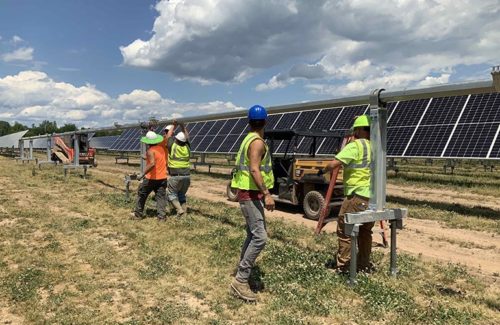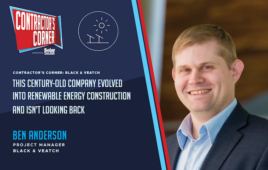We’re supposed to be confined to our homes and minimizing contact with anyone outside of that circle because a pandemic has swept the globe, but American businesses are slowly opening despite COVID-19’s standing presence.
It’s not the time to start pulling back any precautions you’ve implemented for your solar installers and administrative staff to safely work while weathering this pandemic. If you want to eat inside a plexiglass booth at your favorite restaurant, that’s your prerogative.
But the solar industry falls under the “essential” category for its role with the electrical grid. We’ve seen enough economic hardships recently from waning tax credits and trade tariffs. Adding a potentially lethal virus to the mix after a standout year for solar like 2019 is some cruel irony, but panels can still be set while you’re standing 6 ft from each other.
Setting ground rules
Businesses across the board felt the disruptive effects of COVID-19 when state shutdowns started in March. For solar developer Nexamp (No. 31 on the 2020 Top Solar Contractors list), business has persisted in all its operating states except New York. For the remainder, Nexamp analyzed the safety requirements for construction handed down in every state — if they had any.
The company picked the most stringent safety requirements from each state and developed some rules of its own if they didn’t meet a certain standard. If new guidance is passed down, Nexamp processes it and changes its safety policy when needed.

This photo was taken before enacting COVID-19 safety policies, but now Nexamp solar installers must do daily self-certification health reports, sanitize shared surfaces and wear gloves and masks to all worksites.
“We’re always trying to keep it simple that we have one program that covers all states we’re working in, and it’s kind of an easy sell internally because it really is just all about safety — taking care of our people, you can always do more,” said Chris Perron, senior VP of EPC at Nexamp.
This synthesis of state and internal safety policy has resulted in a process that has checks at every level to keep the work flowing and, more importantly, keep employees safe. Nexamp designated COVID safety officers that check-in with construction superintendents and managers and make sure installers are following safety guidelines.
Every employee has to complete a self-certification every day, which declares they’re healthy and fit to work; people can no longer just pop in to check on solar construction sites, visits must be planned and approved; everyone must wear masks and cut-resistant gloves and maintain social distance; mutual surfaces are sanitized and employees are discouraged from eating together in confined spaces like worksite trailers; and the company has used mostly hand sanitizer on remote solar sites where water isn’t as accessible.
It’s not like how installing solar used to be, but Perron said it’s been effective.
“Anytime you’re implementing safety measures, it really has to be top-down driven, mainly because this is taking care of our employees, but as you know, there are regulatory requirements as well,” he said. “Do the right thing for your employees, but also if you do the right things, it supports you on a legal, regulatory point of view, it supports you with a local community. Doing the right thing tends to help you out with all of these.”
Distancing on the rooftop
As if it wasn’t hot enough working on rooftops, now add the extra layers of masks and gloves to the mix. Commercial EPC American Sentry Solar (No. 237) has been following CDC guidelines and adding some regulations of its own since adapting to working safely during the coronavirus pandemic.
Everyone from the Maryland company is working remotely, including installers, who are running company vehicles from their homes. Installs have been three- to four-person operations. Two people are doing system assembly and mounting on the rooftop, and one or two are handling the electrical end inside. Anyone inside is wearing masks and gloves, but on the roof, masks are optional.

Piloted equipment and shared surfaces have required constant sanitizing, but despite the extra precautions, solar installations have continued.
“The only thing we did not do is masks on roofs, just because they can get very hot and there’s more of a safety concern with that, especially when it’s only two people and you’re not around anybody else,” said Gailan Wensil-Strow, VP of solar operations at American Sentry Solar.
He fears that with the elevation and sun exposure, masks could accelerate heat exhaustion.
Employees have personal thermometers and take their temperatures regularly, and anyone experiencing symptoms is asked to stay home and not return to work until they test for the virus and it comes back negative. If someone does contract coronavirus, they’re sent home, and American Sentry can determine who the person has been in contact with in the last two weeks by looking at the company vehicle’s GPS.
“Business has been slower due to natural expectations of sales, but the actual process of installations has gone well,” Wensil-Strow said. “I think the only reason we have is because we have a lot of experienced guys that are trusted. We’ve learned to trust that they are responsible and don’t need to be hand-held, and I think that respect is mutual.”
The efficiency of remote sales
Salespeople shouldn’t be taking in-home visits to potential customers right now. Rooftop contractor Freedom Solar Power (No. 99) initially sent its employees home after calls for shelter-in-place were set in Texas. A small crew is at the company’s corporate office, others are working remotely and installers are following COVID safety rules: masks, gloves, sanitizing, social distancing and staying outside during builds.
The company is based in Austin but works across the entire state, and the sweeping transition to remote sales calls has made Freedom Solar reconsider how it’s approaching clients.
“On the ‘resi’ business, our sales guys are able to go out and do a lot more appointments in a day than they could, because they’re just doing them on Zoom,” said Bret Biggart, CEO of Freedom Solar Power. “So, from an efficiency standpoint, we’re able to do a lot more consultations with interested customers in a day than we could if our guys were having to drive 30 minutes here or an hour there.”

Since COVID-19 construction regulations were enacted, solar installers have had to start physically distancing themselves, especially on close-quarter work sites like rooftops.
Biggart believes there’s a growing interest in solar because of the uncertainty of the oil market, especially in Texas where its largest exports are petroleum and coal. Pair that with a pandemic, and customers are trying to lock into a set energy price and not rely so heavily on the grid. He thinks interested customers will prefer Zoom sales calls even after the pandemic.
“I think there’s a large majority of people going forward after COVID that would say, ‘I’d rather have a Zoom appointment just because I’d rather interact with somebody over the internet than I would have them in my home,’” Biggart said.
Although it may seem counterintuitive, he said virtual conferencing has made his team feel more connected too. Biggart has been making weekly calls with everyone from Freedom Solar since March, frequently relaying updates on customers, safety practices, selling techniques and company value propositions.
“From a communication standpoint, it’s great because it gave us a reason to really communicate with our people and that always leads to positive impacts,” he said. “People feel more involved, people feel like they’ve gotten feedback, people feel like they know what’s going on in other parts of the business. That’s been really helpful, and quite frankly, we’re going to keep doing it indefinitely.”
Socially, the world might feel at a standstill. We can’t safely enjoy many of life’s shared pleasures because we’d put ourselves and others at risk. And while we’ve seen how a less active world has reduced pollutants and allowed the planet to heal a little, global warming is still bearing down on us.
So, grab your mask and gloves and keep installing those panels.
This story was featured exclusively in our 2020 Top Solar Contractors issue. See the issue and full list of top U.S. solar installers here.





Tell Us What You Think!